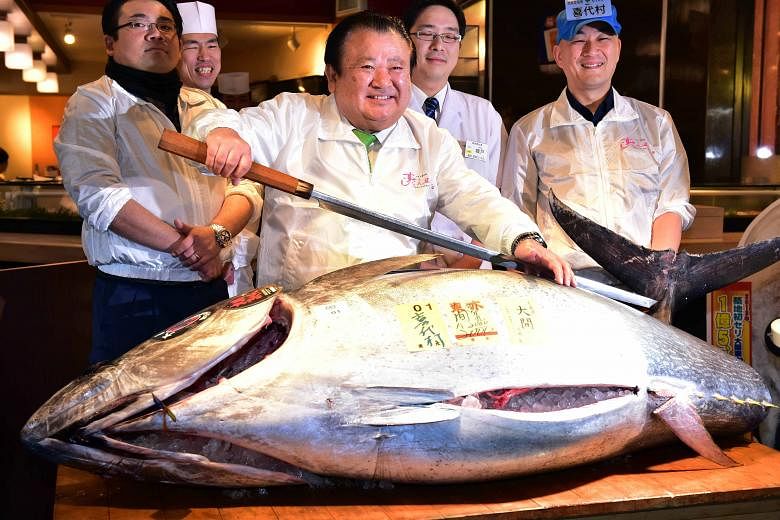TOKYO • Mr Kiyoshi Kimura's ear-to-ear grin is tough to miss in Japan. It is splashed across billboards advertising his nationwide sushi chain.
But the self-styled Tuna King is not smiling about plans to move Tokyo's famous Tsukiji market and warns that its identity is at risk of being destroyed.
His office is a block away from the historic site where, in 2013, he famously slapped down a record US$1.8-million bid at the traditional New Year bluefin tuna auction.
But this month's sale - where he prevailed again with a modest US$117,000 (S$168,000) bid for a 200kg tuna - marks his last victory at the market, which is popular with locals and tourists alike.
Backers of the controversial move, planned for November, say the sprawling 80-year-old complex is tired and out-of-date, with an ancient refrigeration system.
Like many other critics, however, Mr Kimura, 63 - a former member of Japan's military who swopped dreams of becoming a fighter pilot for a life in the fish business - is not sold on the idea. "It's a bit sad that Tsukiji is moving."
He abandoned plans to help build a leisure facility at the new site, which was set to feature a 1,000-seat food court, restaurants and retailers, as well as Tokyo's biggest hot spring, known as an onsen.
The four-decade fish veteran is not even sure he will build one of his own Sushizanmai restaurants at the less charming new facility built on reclaimed land in Tokyo Bay.
He said of the new location: "A fish market is a place where people gather. But if there is no sense of excitement, people won't come."
Sushizanmai's advertisements star a beaming Mr Kimura, his stout frame squeezed into a smock and rubber boots, standing over the monster specimens.
Bluefin is usually the priciest fish available at Tsukiji and a single piece of "otoro", or the fish's fatty underbelly, can cost up to several thousand yen at high-end Tokyo restaurants.
Mr Kimura disputes suggestions that his eye-popping offers - including the record 2013 purchase sparked by a bidding war with a Hong Kong chain - are just a publicity stunt.
"My business is about giving customers delicious, high-quality produce," he said. "To make customers happy is the best thing that could happen. If you're doing it just for marketing, I don't think you can pass that feeling on to customers."
In fact, paying top yen for tuna helps keep prices up and protects the species, he says.
Environmentalists warn that bluefin tuna could be on its way to extinction. Japan is the world's biggest consumer of the fish and has faced calls to rein in catches.
But Mr Kimura is convinced that tuna will always reign supreme in the sushi world.
"Stocks of saba (mackerel) and aji (horse mackerel) have also been depleted from time to time, but they always come back."
AGENCE FRANCE-PRESSE

